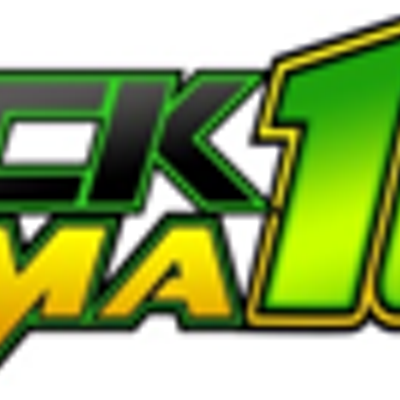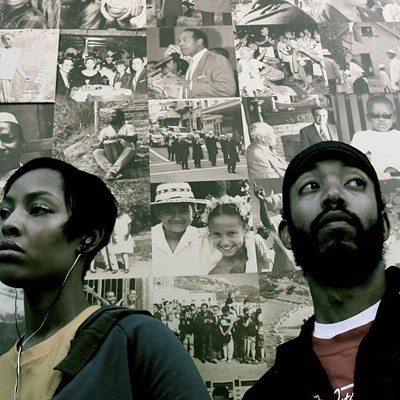That's according to John Cummings, guitarist for the oft-celebrated and endlessly creative Scottish rock band Mogwai, which generally does not perform songs with lyrics or vocals.
"It's not that we don't have a lot to say," Cummings said during a recent phone interview while on the road stateside. However, because he spoke in a thick Scottish brogue, much of what Cummings had to say was either indecipherable to these ears, or it required tedious requests for repetition. Cummings was game, though.
"We've got a lot to say in a verbal way. I mean, a couple of us are quite chatty when we get going with discussions about intellectual thoughts and feelings and such things. But that doesn't really manifest itself in the music we make and give back to the people."
Just because you're working in the realm of pop or rock music, Cummings argued, you shouldn't feel obliged to make significant contributions to the literary body.
"That doesn't seem really justified to me. If you don't mean it, it seems a little dishonest."
Mogwai is on its way to Tucson, where it will play Wednesday, Sept. 10, at the Rialto Theatre, with opening act the Fuck Buttons.
Even without words, Mogwai's dramatic instrumentals to speak significantly.
On the band's newest full-length CD, The Hawk Is Howling (scheduled for release by Matador Records on Sept. 23), the opening track, "I'm Jim Morrison, I'm Dead" begins with a stark, Satie-like piano figure that gives way to a hypnotic blizzard of guitar feedback, through which delicate shards of melody insist on piercing. It's lovely and ominous at the same time, and some listeners may be reminded of the spacious tone poems of Icelandic band Sigur Rós.
That's followed by the full-throttle and heavier-than-thou guitar workout "Batcat," which threatens to bring to mind fellow instrumental rock bands such as Don Caballero and Pelican.
Then there's "Danphe and the Brain," in which a monstrous iceberg of guitars shifts inexorably, like tectonic plates, with the slow, patient chord changes bringing to mind the minimalism of composer Philip Glass. Or there's "Local Authority," a soothing meditative melody of guitar and piano that could have come from Tom Verlaine's more mellow records, or David Bowie's collaborations with Brian Eno on Low and Heroes.
The album's masterpiece, "The Sun Smells Too Loud" combines elements of throbbing electronica, catchy guitar rock, shimmering background textures and spacey organ.
Formed in the mid-1990s in Glasgow, Mogwai originally came together as vehicle for longtime friends and guitarists Stuart Braithwaite and Dominic Aitchison (in the company of drummer Martin Bulloch) to explore all of the textures afforded by the six electrified strings.
Soon after, Cummings joined the group, adding a third guitar to the mix. These days, the band, which also includes Barry Burns, adds a variety of keyboards to the jumble of drums and wires.
Since the beginning, Mogwai's members have strived to create what they had heretofore only heard in their heads, Cummings said.
"Well, I didn't join until three or four months after they started the band, so I couldn't tell you the exact circumstances, but it was definitely designed to play music that, from our perspective, no one else was playing. It just didn't seem like a lot of people in Glasgow or anywhere else were interested in that sort of music, or even what we were doing after we started. At first."
However, in 2008, a great many bands play rock music that is devoid of words, or close to it, and many of them are lumped (perhaps unfairly) into the category known as "post rock." Among them are the aforementioned Pelican and Don Caballero, as well as such acts as Godspeed You! Black Emperor, Explosions in the Sky, Tortoise, Mono and the legendary Savage Republic.
Cummings said he and his bandmates are well aware that other groups are mining a similar vein in music, but he doesn't consider Mogwai to be a pioneer of the form.
"It does seem like there is a justification for people saying certain bands are similar to us. It's not like we really invented the instrumental-rock style, and not many of them sound all that much like we do. Everybody does their own thing, and most do it well."
In case you were wondering, Mogwai was named for those furry little creatures in the movie Gremlins, and the name also happens to be a transliteration of a Cantonese word that means evil spirit or demon. Like those bug-eyed darlings in the 1984 movie, the band's music can be cuddly or menacing, depending on its mood.
Because of the expansive, cinematic quality of Mogwai's music, it was something of a no-brainer when the band begun working in movies.
Between the release of the band's last "proper" album, Mr. Beast, in 2006, and the making of The Hawk Is Howling, Mogwai collaborated on the score for director Darren Aronofsky's The Fountain with composer Clint Mansell, and the group composed and recorded the soundtrack for the documentary Zidane: A 21st Century Portrait, about the French soccer star Zinedine Zidane.
And despite what Cummings says, the guys in Mogwai are able to indulge their collective poetic muse through the titling of their songs. The methods by which they arrive at those titles are never the same, he added.
"Usually, it's a matter of necessity. Some are purely musings; some are absurdities. We all usually have some titles in mind, but it usually ends up being some fucking rubbish that we ended up talking about at the time. They're like pots of gold at the end of the rainbow."










